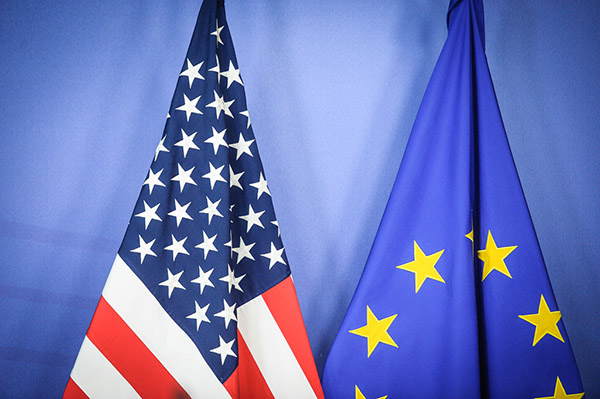
The situation in the Pacific is on the mend, at least for the US. But storm clouds are closing over the Atlantic, transatlantic affairs. Obama has managed to close the TPP (the Trans-Pacific Economic Cooperation, the US, Japan, Australia, New Zealand, Malaysia, Brunei, Singapore, Vietnam, Canada and, in Latin America, Mexico, Peru and Chile; 40% of the global economy) but the TTIP (the Transatlantic Trade and Investment Agreement between the EU and Washington that would create the world’s largest market) is slipping from his grasp. And not just because the negotiations are faltering, but because there is a growing mistrust between the two sides of the Atlantic.
The US and Europe (to the extent that the EU has a single vision) disagree on many things: from what to do on Syria to what to do with Russia. But it is in the realm of the digital economy where the rift is widening. First, given the power of companies like Google and Amazon against which Brussels –spurred on by certain EU economies, primarily France and Germany, that seek greater protection– is opening a file on the grounds of competition policy.
But perhaps something that is more damaging to European sensitivities is the mistrust generated by the US government’s monitoring (essentially by the NSA, the National Security Agency) of the digital communications of Europe’s citizens, and even of its leaders. Edward Snowden’s revelations on the extent of US spying had already given rise to serious crisis.
A new major obstacle has emerged with the ruling on 6 October by the EU Court of Justice (ECJ) in Luxembourg that invalidates the legal measures related to Safe Harbor, the agreement between the European Commission and the US that allowed American companies to transfer all the data on their customers or users in Europe to servers located, as most are, in the territory of the world’s leading economic power, which is where the largest companies in the sector originate from. A key reason cited by the Court is that ‘access on a generalised basis’ to these electronic communications ‘must be regarded as compromising the essence of the fundamental right to respect for private life’. There was a previous European ruling on the so-called ‘right to be forgotten’, essentially affecting Google. The case against Safe Harbor was initiated by Max Schrems, a 27-year old Austrian Law student who called the ruling a ‘milestone for online privacy’. Further, in its views on the TTIP, the European Parliament has requested that data privacy is not compromised by the flows.
More than 4,000 companies, including the major ones, operate under this agreement. The ruling has led these firms to a state of uncertainty and to accusations that the EU and its courts are disrupting the industry. The judgment of the European Court calls into question an essential chapter of the TTIP on the issue of electronic commerce. It might even hinder progress towards a digital single market in the EU, let alone at the transatlantic level. There is no easy solution: either there is a new agreement that takes into account the ruling, as the European Commission is pondering –while its negotiations with the US for a full data transfer agreement have now become more difficult–, or there are bilateral agreements with the Member States, although some authorities in Germany consider that even that is not possible as the US offers no guarantees of data protection.
The ruling also paves the way for EU citizens to request their own national authorities to forbid their personal data from being transferred to the US, which further complicates the situation (it was the Irish data protection authority that was entrusted with Safe Harbor). In any case, the judgment does not guarantee in any way that the EU member states themselves will not monitor their own citizens.
The slap in the face to the Safe Harbor agreement adds to Europe’s growing misgivings about the TTIP, the lack of transparency in its negotiation (and the US delay in making explicit some of its positions), and about issues of investor-State arbitration and consumer protection, among others. In any case, the clock is ticking. The date by which the agreement should be finalised, January 2017 –the end of Obama’s term in office–, is now in question and doubts about its subsequent ratification by Congress, the European Parliament and the EU’s Member states have led to a complete state of uncertainty.
Obama’s victory in the Pacific is not guaranteed. The US has promoted the agreement to further deepen the booming regional market and to design rules to protect itself against the rise of China. But now even Japan is considering whether it should insist on inviting Beijing to join the TPP, and China might react. Obama has no guarantee that the treaty will be ratified by all countries, and, particularly, by the US Congress. Hillary Clinton, the Democrat with the best chances to be candidate and who promoted the agreement while serving the current President as Secretary of State, has now declared against it in a political about-face prompted by Bernie Sanders pressuring from the left. That is a shot across the bows of what is already more than just a mere proposal. For if the TPP and TTIP both forge ahead, the US will become even more of a global arbiter.


